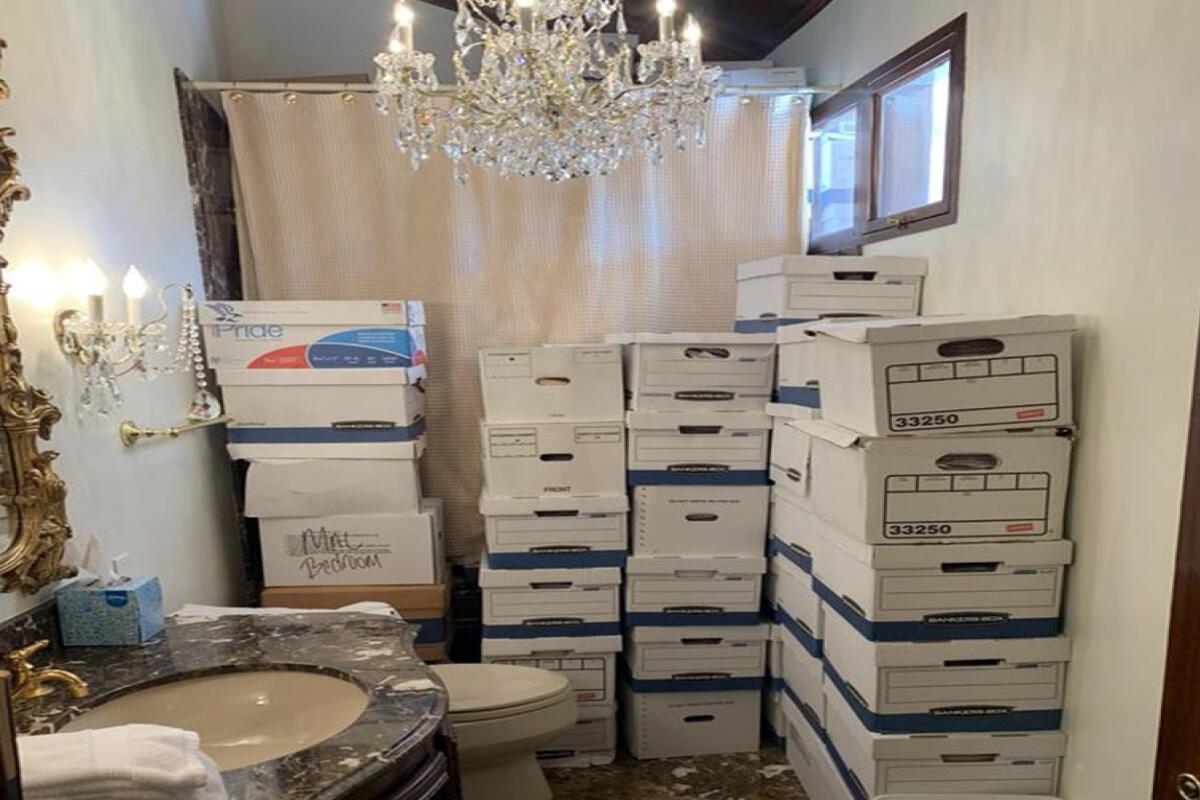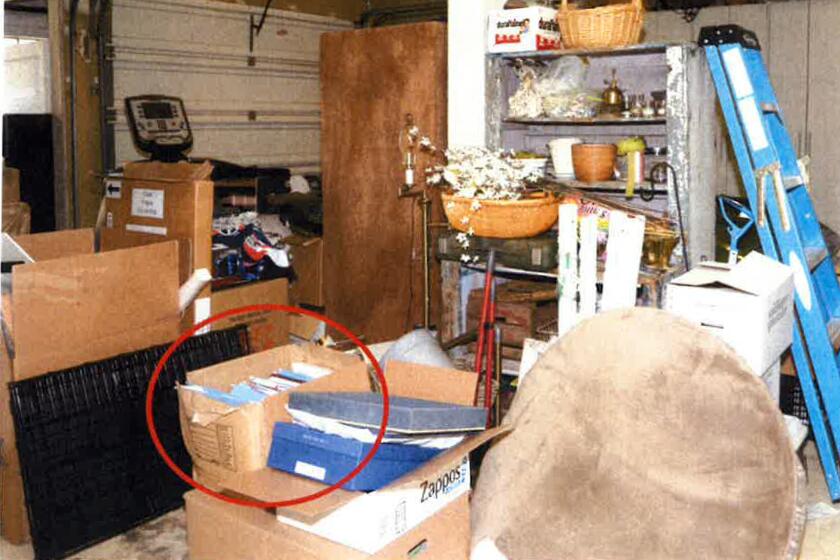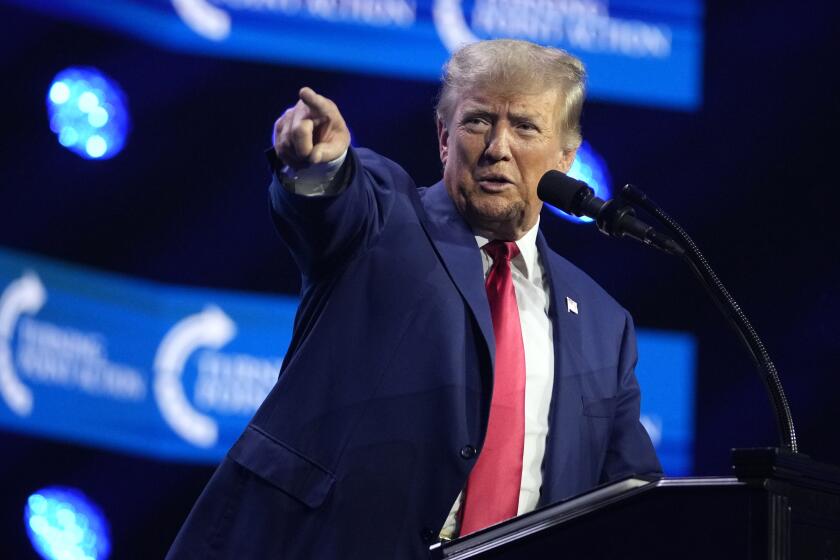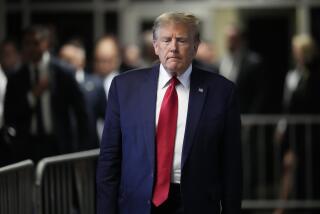Judge rejects bid by Trump to throw out classified documents case on constitutional grounds

- Share via
FORT PIERCE, Fla. — A federal judge on Thursday rejected a bid by Donald Trump to throw out his classified documents criminal case and appeared skeptical during hours of arguments of a separate effort to scuttle the prosecution ahead of trial.
U.S. District Judge Aileen Cannon issued a two-page order saying that though the Trump team had raised “various arguments warranting serious consideration,” a dismissal of charges was not merited.
Cannon, who was nominated to the bench by Trump, had made clear during more than 3½ hours of arguments that she was reluctant to dismiss one of the four criminal cases against the 2024 presumptive Republican presidential nominee. She said at one point that it would be “quite an extraordinary” step to strike down an Espionage Act statute that underpins the bulk of the felony counts against Trump but that his lawyers contend is unconstitutionally vague.
The special counsel who investigated President Biden over his handling of classified information says there are ‘clear’ differences from Donald Trump’s case.
As Trump looked on in the courtroom, his attorneys pressed Cannon to throw out the case, arguing he was legally entitled to keep the sensitive records he is charged with illegally retaining after he left the White House.
His lawyers say the Presidential Records Act gave him the authority to designate as personal property the records he took with him to his Mar-a-Lago estate in Florida. Prosecutors say those included top-secret information and documents related to nuclear programs and the military capabilities of the U.S. and foreign countries.
Cannon’s ruling covered only the Espionage Act arguments. A separate motion argued Thursday about whether Trump was entitled under the Presidential Records Act to retain the documents remains pending, but the judge also seemed disinclined to throw out the case on those grounds too.
“It’s difficult to see how this gets you to the dismissal of an indictment,” she told a Trump lawyer at one point.
The hearing was the second this month in the case in Florida, which has unfolded slowly in the courts since prosecutors first brought charges in June. Cannon heard arguments on March 1 on when to schedule a trial date, but has yet to announce one and gave no indication Thursday on when she might do so. Prosecutors have pressed the judge to set a date for this summer. Trump’s lawyers are hoping to put it off until after the election.
After the hearing, Trump on his Truth Social platform took note of the “big crowds” outside the courthouse, which included supporters with flags and signs who honked their car horns in solidarity with the former president. He again called the prosecution a “witch hunt.”
Some of Thursday’s arguments centered on the 1978 statute known as the Presidential Records Act. The law requires presidential documents to be turned over to the National Archives and Records Administration, though former presidents may retain notes and papers created for purely personal reasons.
Trump’s lawyers contend that he was free under that law to to do with the records as he pleased.
“He had original classification authority,” defense lawyer Todd Blanche said. “He had the authority to do whatever he thought was appropriate with his records.”
But prosecutor David Harbach told Cannon that there are “all sorts of reasons” that Trump’s argument is wrong. Prosecutors said the files Trump is charged with possessing are presidential records, not personal ones, and that the statute does not apply to classified and top-secret documents, like those kept at Mar-a-Lago.
“The documents charged in the indictment are not personal records. They are not,” said David Harbach, a member of special counsel Jack Smith’s team. “They are nowhere close to it under the definition of the Presidential Records Act.”
In the first hearing before federal Judge Aileen Cannon, who has set the trial for mid-August, prosecutors and Trump’s lawyers seek a later date, but disagree how much later.
Trump’s lawyers also argued that the law that underpins the bulk of the charges is too vaguely worded to enforce against a former president. At issue is a law that makes it a crime for an unauthorized person to willfully retain national defense information. That charge forms the basis of 32 of the 40 felony counts against Trump in the case.
Defense lawyer Emil Bove said ambiguity in the statute permits what he called “selective” enforcement by the Justice Department. Bove said that includes President Biden, the recent subject of a critical report by special counsel Robert Hur on handling of classified information.
“The court’s obligation is to strike the statute and say, ‘Congress, get it right,’” Bove told Cannon.
Jay Bratt, another prosecutor with Smith’s team, disputed that the statute was unclear.
The judge told Trump’s attorney that striking down a statute — as the defense is seeking — would be “quite an extraordinary step.” But she also pointedly noted to a prosecutor that no former president has ever been charged with mishandling classified documents.
Bratt responded that there has never been another situation “remotely similar to this one.”
Trump is accused of intentionally holding on to some of the nation’s most sensitive documents at Mar-a-Lago — returning only a fraction of them upon demand by the National Archives. Prosecutors say he urged his lawyer to hide records and to lie to the FBI by saying he no longer was in possession of them and enlisted staff to delete surveillance video that would show boxes of documents being moved around the property.
Cannon has suggested in the past that she sees Trump’s status as a former president as distinguishing him from others who have held onto classified records.
After the Trump team sued the Justice Department in 2022 to get his records back, Cannon appointed a special master to conduct an independent review of the documents taken during the FBI’s Mar-a-Lago search. That appointment was later overturned by a federal appeals court.
Trump is separately charged in a federal case in Washington with conspiring to overturn the results of the 2020 presidential election. Trump has argued in both federal cases that presidential immunity protects him from prosecution, though Cannon has not agreed to hear arguments on that claim in the documents case. The Supreme Court is scheduled to hear arguments on Trump’s immunity claim in the election interference case next month.
Tucker, Durkin and Spencer write for the Associated Press.
More to Read
Get the L.A. Times Politics newsletter
Deeply reported insights into legislation, politics and policy from Sacramento, Washington and beyond. In your inbox three times per week.
You may occasionally receive promotional content from the Los Angeles Times.












